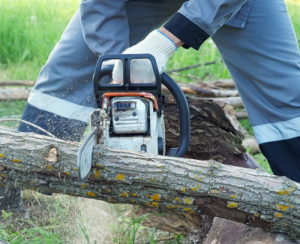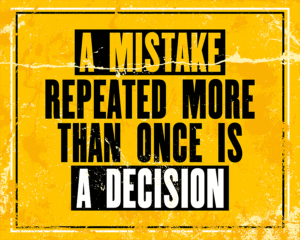 The notion of the Green Lumber Fallacy was first espoused by Nassim Nicholas Taleb in his book Antifragile: Things That Gain From Disorder. It is the idea that someone can mistake one important type of knowledge for another, meaning that they might be focussing on the right thing but that thing is too complex for them to figure it out intellectually. We might think we know why something’s happening but we really don’t.
The notion of the Green Lumber Fallacy was first espoused by Nassim Nicholas Taleb in his book Antifragile: Things That Gain From Disorder. It is the idea that someone can mistake one important type of knowledge for another, meaning that they might be focussing on the right thing but that thing is too complex for them to figure it out intellectually. We might think we know why something’s happening but we really don’t.
The name of the fallacy comes from the most successful ever trader in green lumbar, who spent his career thinking that it was just wood painted green when actually it was freshly cut trees. The fact that he didn’t understand the product didn’t stop him being successful in trading it. In the world of betting, the idea of the Green Lumbar Fallacy comes in when people who really know a sport believe that that means that they understand betting, which is not necessarily true.
Antifragile by Nassim Taleb
 Nassim Taleb is a self-styled scholar and author, having previously worked as a currency trader and statistician. His background involves solving problems and analysing risk, looking at probability as a key factor of decision making. The Black Swan, the author’s first book, was in The Times newspaper’s list of the most influential books since the Second World War, indicating the level to which he is respected for his work.
Nassim Taleb is a self-styled scholar and author, having previously worked as a currency trader and statistician. His background involves solving problems and analysing risk, looking at probability as a key factor of decision making. The Black Swan, the author’s first book, was in The Times newspaper’s list of the most influential books since the Second World War, indicating the level to which he is respected for his work.
Published by Random House and Penguin in November of 2012, Nassim Taleb’s Antifragile builds upon work that Taleb had already done in previous works such as Fooled by Randomness, The Black Swan and The Bed of Procrustes. It is the fourth book in a philosophical treatise entitled Incerto, with Skin In The Game: Hidden Asymmetries In Daily Life completing the works.
Taleb’s over-arching idea is that some things thrive from volatility, but that there is no word to describe the opposite to fragility. He therefore coined the term ‘antifragile’, suggesting that it went beyond mere resilience or robustness into something greater. He summed it up by saying, “Simply, antifragility is defined as a convex response to a stressor or source of harm.”
The Green Lumbar Fallacy Explained

There are numerous different things that Taleb covers in the book, but it is the Green Lumbar Fallacy that we’re obviously most interested in here. He explained this by saying that it is,
“mistaking the source of important or even necessary knowledge, for another less visible from the outside, less tractable one… how many things we call ‘relevant knowledge’ aren’t so much so.”
The basic idea is that you don’t need to understand something to be good at it. Joe Siegel made a huge amount of money trading in green lumbar on the mistaken belief that it was lumbar that had been painted green, rather than freshly cut wood that had not yet been dried out. His lack of knowledge on the subject didn’t alter his ability to trade in it and make himself a huge amount of money.
Siegel didn’t know why it was that the lumbar was ‘green’, but he did know things about it that non-experts didn’t think were important. Being able to predict the order flow of lumbar might be seen as unimportant to someone that thinks why it is green is a key factor, but in actual fact the opposite was true. He didn’t know what some deemed ‘important’, but he did know what actually mattered and this made him successful.
One of the earliest known examples of what would become known as the Green Lumbar Fallacy can be found in the story of Thales. He reserved presses in advance of the olive season, renting them out at a higher price than he reserved them at. Aristotle thought it was because he could forecast the weather, but it was actually just that he realised people would need olive presses when the season arrived.
To put it another way, the Green Lumbar Fallacy essentially says that you don’t need to understand something intricately to exploit it, you simply need to pay attention to the essential information. Siegel didn’t know why the lumbar was green just as Thales didn’t know what the weather was going to be like, but they both understood the crucial information that allowed them to take advantage of their situation.
How It Relates To Betting
 The obvious question is how, exactly, the Green Lumbar Fallacy relates to betting. The answer comes in the fact that you don’t need to understand a sport inside out in order to be a successful bettor. Having knowledge of a subject doesn’t necessarily mean that you therefore get the risks that are associated with trading in it. Instead, understanding the risks can allow you to be successful despite having no knowledge of what you’re betting on.
The obvious question is how, exactly, the Green Lumbar Fallacy relates to betting. The answer comes in the fact that you don’t need to understand a sport inside out in order to be a successful bettor. Having knowledge of a subject doesn’t necessarily mean that you therefore get the risks that are associated with trading in it. Instead, understanding the risks can allow you to be successful despite having no knowledge of what you’re betting on.
There’s an obvious argument that the ideal skillset is to have is a combination of market knowledge in addition to an understanding of risk, but if you only have one of them then knowledge of the market that you’re betting on is the least important of the two. It’s why it doesn’t always make sense to listen to what former professionals have to say when offering ‘tips’ on something, because taking part in the sport doesn’t automatically mean knowledge.
Knowing Risk & Doing Something About It

We look at the idea of the Green Lumbar Fallacy because Nassim Taleb’s theory is the one that popularised it. In actuality, though, there have been countless examples of it being made public without the same link being made. One such example is the work of Billy Beane at the Oakland Athletics, using analytics and evidence-based research to assemble a competitive baseball team with a limited budget.
A book about the work, Moneyball, popularised it and it was later turned into a film starring Brad Pitt, but the idea was essentially that the old way of doing things in baseball could be improved upon. A lack of ‘traditional’ knowledge used by scouts didn’t stop Beane from making the Oakland Athletics into a competitive team, given that he had other knowledge that allowed him to look outside the box.
The abandoning of baseball’s more subjective approach to players in favour of an analytical one was soon followed in other sports, including by some Premier League football clubs. Bettors also began to think about the work that Beane was doing and wondering if they could apply it to how they decided upon their wagers. Could looking at things outside of the usual metrics help them win some money?
Avoiding Mistakes
 For beginners in the world of betting, the biggest mistake that is made most commonly is the assumption that their knowledge of a sport will lead to success in betting on that same sport. Just as someone trading in foreign exchange currencies doesn’t need to know what country the currency is used in in order to be successful, so too is it unimportant for a bettor to understand the ins and outs of a sport in order to win their wagers.
For beginners in the world of betting, the biggest mistake that is made most commonly is the assumption that their knowledge of a sport will lead to success in betting on that same sport. Just as someone trading in foreign exchange currencies doesn’t need to know what country the currency is used in in order to be successful, so too is it unimportant for a bettor to understand the ins and outs of a sport in order to win their wagers.
In short, there is a difference between what is unimportant and what is relevant when looking at sports betting. The Green Lumbar Fallacy can quickly become the Green Lumbar Problem when people focus on the wrong thing when trying to make a decision. Looking at the weather forecast when you’re about to bet on an indoor event would be a good explanation of this.
When he was looking at the world of green lumbar, Siegel realised that reading into major narratives and grand theories about why the price of it fluctuated so much was entirely unimportant when it came to what he needed to know. All he needed was the basic trading principles, which was something that he knew well and was able to apply them to green lumbar trading, even when others dismissed those things as unimportant.
The biggest mistake that punters make is thinking that one set of knowledge is important and another set isn’t. Rather than taking Siegel’s approach of considering which things mattered and concentrating on them, inexperienced bettors have a tendency to think that the knowledge that they already have is the most important. Often, the most important thing is also the most obvious, so you don’t need to overthink it.
Don’t Limit Your Betting
 Another way of avoiding being victim to the Green Lumber Fallacy is by ensuring that you don’t limit your betting choices. If you’re a massive football fan, for example, then you might be tempted to only bet on the Premier League, Champions League and World Cup, say. In reality, the knowledge that you can gain from betting will allow you to bet on basically any sport and be successful by having the right sort of knowledge.
Another way of avoiding being victim to the Green Lumber Fallacy is by ensuring that you don’t limit your betting choices. If you’re a massive football fan, for example, then you might be tempted to only bet on the Premier League, Champions League and World Cup, say. In reality, the knowledge that you can gain from betting will allow you to bet on basically any sport and be successful by having the right sort of knowledge.
The most successful bettors can turn their hand to anything and be successful by using the principles they have learned from betting on other sports. It’s why the idea of successful former players or jockeys or what have you making good bettors is a nonsense, for the simple reason that there is no connection between being good at a sport and being good at betting on that same sport.
Bettors might not know as much as former players about the way that the intricacies of a sport work, but they’ll know how to successfully predict outcomes based on statistics better than those that simply have a ‘feel’ for the game. This is when the idea of having the right sort of knowledge comes into play, giving punters with good knowledge of the way betting works an advantage over former players.
Why Good Bettors Are At An Advantage
 The very best bettors out there understand a wealth of things that give them an advantage regardless of whether or not they know the subject that they’re looking to bet on. They get things such as probability, the influence of randomness, how line movement can matter and so on. They’re also well aware of the cognitive biases that can affect people’s betting decisions, working to avoid them where possible.
The very best bettors out there understand a wealth of things that give them an advantage regardless of whether or not they know the subject that they’re looking to bet on. They get things such as probability, the influence of randomness, how line movement can matter and so on. They’re also well aware of the cognitive biases that can affect people’s betting decisions, working to avoid them where possible.
Punters that are good at what they do don’t get too caught up in the big theories around why a team or player might win or lose, instead looking at the things that others deem to be ‘unimportant’. Just as traders that knew intricate details about lumbar didn’t make as much money as someone who knew nothing about it, so too might the sports enthusiasts make less money betting on their sport that someone who knows about what matters.
The thing that tends to drive success is different in different sports and for the various participants in said sports. Manchester City have been successful in the Premier League because of the money that the club has been able to spend, but they’re not the only team that have won the title during the reign of Sheikh Mansour. Looking into things like statistics, psychology and probability can give other clubs an edge over money.
Understand Markets Is Critical
 What the Green Lumber problem ultimately gets at in relation to gambling is that understanding how a market works is more important than understanding the intricacies of the thing you are betting on or trading. If you can evaluate a betting market in this way, using available data and statistics, you can often spot ‘weak lines’, i.e. where the odds offered are greater than the probability of that event occurring.
What the Green Lumber problem ultimately gets at in relation to gambling is that understanding how a market works is more important than understanding the intricacies of the thing you are betting on or trading. If you can evaluate a betting market in this way, using available data and statistics, you can often spot ‘weak lines’, i.e. where the odds offered are greater than the probability of that event occurring.
You do not even need to complete a wager to take advantage of market knowledge. Clever bettors can back a market when the odds are high and then sell that bet back if the odds shorten, at a profit. You could do this using cash out.
Those that use exchange betting will often back a bet at high odds and then lay the same bet later if the odds shorten, guaranteeing a profit whatever the result. In this example understanding the event you are betting on is less important than understanding how markets work. As with the olive press example earlier the idea is to buy low and sell high.
Find A Balance
 Would Siegel have been better at his job if he’d understood that free lumbar wasn’t just wood painted green? It’s difficult to say, though it is fairly likely. Bettors that don’t know anything about sport but are aware of the intricacies of things such as psychology and statistics might well have an edge over punters that only know about the sport in a practical sense, but people that know both things have an edge over both variants.
Would Siegel have been better at his job if he’d understood that free lumbar wasn’t just wood painted green? It’s difficult to say, though it is fairly likely. Bettors that don’t know anything about sport but are aware of the intricacies of things such as psychology and statistics might well have an edge over punters that only know about the sport in a practical sense, but people that know both things have an edge over both variants.
That doesn’t mean that you should just trust your instinct, of course. What it does mean, though, is that an instinct that is backed up with statistics can be a powerful thing. Often, the combination of a little bit of knowledge in a chosen subject as well as a large degree of knowledge in the things that matter in the world of betting can be a strong combination that allows punters to be in a confident position when it comes to their bets. Don’t get caught up with the Green Lumbar Fallacy and you’ll be in a better place for it.
